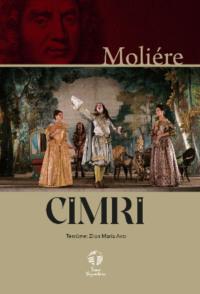 полная версия
полная версияThe Magnificent Lovers
Cle. But for which of the two princes have you invented this trick?
Ana. Both have courted my assistance, and I have promised to both the influence of my art. But the presents of Prince Iphicrates, and the promises which he has made, by far exceed all that the other could do. Therefore, it is Iphicrates who will profit by all I can invent, and as his ambition will owe everything to me, our future is sure. I will go and take my time to confirm the princess in her error, and, the better to prepossess her mind, skilfully show her the agreement of the words of Venus with the predictions of the celestial signs which I told her I have cast. Be it your part to go and get our six men to hide themselves carefully in their boat behind the rock, and make them wait quietly for the time when the princess comes alone in the evening for her usual walk. Then they must suddenly attack her like pirates, in order to give the opportunity to Prince Iphicrates to rush to her rescue, and lend her the help which is to put Eriphyle in his hands according to the words of Venus. I have forewarned the prince, and, acting on the belief in my prediction, he is to hold himself in readiness in that little wood that skirts the shore. But let us leave this grotto. I will tell you as we go along all that is necessary for you carefully to observe. Here is the Princess Eriphyle; let us avoid her.
SCENE V. – ERIPHYLE (alone)Alas! how hard is my destiny! What have I done to the gods that they should interest themselves in what happens to me?
SCENE VI. – ERIPHYLE, CLEONICECleon. Here he is, Madam; he followed me the moment he heard your commands.
Eri. Let him come hither, Cleonice, and leave us alone for one moment.
SCENE VII. – ERIPHYLE, SOSTRATUSEri. Sostratus, you love me.
Sos. I, Madam?
Eri. Yes, Sostratus, I know it, I approve of it, and allow you to tell me so. Your love appeared to me accompanied by all the merit which could render it valuable to me. Were it not for the rank in which heaven has placed me, I might tell you that your love would not have been an unhappy one, and I have often wished for a position in which I might fully show the secret feelings of my heart. It is not, Sostratus, that merit fails to have for me all the value which it should have, and because, in my inmost soul, I do not prefer the virtues which you possess to all the magnificent titles which adorn others. The princess my mother has also, it is true, left me free in my choice, and I have no doubt that I could have obtained her consent according to my wish. But, Sostratus, there are stations in life where it is not right to wish that what pleases us should come to pass. It is painful to be above all others, and the burning light of fame often makes us pay too severely for having yielded to our inclination. I never could, therefore, expose myself to it, and I thought I would simply put off the bonds I was solicited to enter. But, at last, the gods themselves will give me a husband, and all these long delays with which I have postponed my marriage, and which the kindness of the princess my mother made possible, are no longer permitted to me. I must resign myself to the will of heaven. You may rest assured, Sostratus, that it is with the greatest repugnance that I consent to this marriage, and that, were I mistress of myself, either I should have been yours or should have belonged to no one. This is, Sostratus, what I had to tell you; what I felt I owed to your merit, and the only consolation which my tenderness can show to your love.
Sos. Ah! Madam, it is too much for one so undeserving as I am! I was not prepared to die with such glory, and from this moment I shall cease to complain of my destiny. If it caused me to be born in a rank below what I could have desired, it has made me to be born happy enough to attract some pity from the heart of a great princess, and this glorious pity is worth sceptres and crowns; is worth the power of the greatest princes of the earth. Yes, Madam, from the moment I dared to love you – it is you, Madam, who allow me to use this bold word – from the moment I dared to love you, I condemned the pride of my aspirations, and determined upon the fate I ought to expect. Death will not surprise me, for I am prepared for it, but your kindness has thrown upon it an honour which my love never dared to hope; I shall now die the happiest and most fortunate of men. If I may yet hope for anything, I on my knees will ask two favours of you: to be willing to endure my presence till that happy marriage which is to put an end to my life takes place; and amidst the glory and long prosperities which heaven promises to your union, to remember sometimes Sostratus, who loved you. May I hope for those favours, O divine princess?
Eri. Go, Sostratus; leave me. You little care for my peace of mind if you ask me to remember you.
Sos. Ah, Madam, if your peace of mind …
Eri. Leave me, Sostratus; spare my weakness; do not expose me to do more than I have resolved upon.
SCENE VIII. – ERIPHYLE, CLEONICECle. Madam, I see you quite melancholy; will you allow your dancers, who express so well all the passions of the soul, to come and give you a sample of their skill?
Eri. Yes, Cleonice; let them do what they like, provided they leave me to my thoughts.
FIFTH INTERLUDEFour pantomimists, as a sample of their skill, adapt their movements and steps to the signs of uneasiness of the young Princess Eriphyle.
BalletACT V
SCENE I. – ERIPHYLE, CLITIDASCli. Where shall I go? which way shall I turn? Where am I likely to find the Princess Eriphyle? It is no small pleasure to be the first to bring news. Ah! here she is! Madam, I come to tell you that heaven has just now given you the husband it reserved for you.
Eri. Alas! leave me, Clitidas, to my gloomy sorrow.
Cli. Madam, I beg your pardon, I thought I did well to come and tell you that heaven has given you Sostratus for a husband; but, since it is unpleasant to you, I will pocket my news, and go back just as I came.
Eri. Clitidas! I say, Clitidas!
Cli. I leave you, Madam, to your gloomy melancholy.
Eri. Stay, I tell you; come here. What is it you say?
Cli. Nothing, Madam. One is sometimes too hasty in coming to tell great people things they don't care about, and I pray you to excuse me.
Eri. How cruel you are!
Cli. Another time I will take care not to come and interrupt you.
Eri. Keep me no longer in suspense; say what it is you came to tell me.
Cli. An insignificant thing about Sostratus, Madam, which I will tell you another time when you are less engaged.
Eri. Keep me no longer in suspense, and tell me the news.
Cli. You wish to know it, Madam?
Eri. Yes, be quick. What is it about Sostratus?
Cli. A wonderful adventure which nobody expected.
Eri. Tell it me at once.
Cli. Will it not trouble you, Madam, in your gloomy melancholy?
Eri. Ah! Speak, I say.
Cli. I must tell you, then, Madam, that the princess your mother was going almost alone through the forest by those little paths which are so pleasant, when a frightful boar – those ugly boars are always doing mischief, and should be banished from civilised forests – when a hideous boar, I say, driven to bay, I believe, by some huntsmen, came right across the path where we were. I ought, perhaps, to adorn my account with an elaborate description of this said boar; but you must try and do without it, if you please, and be satisfied to know that it was a terribly ugly brute. It was going on its way, and it would have been as well not to disturb it; but the princess wished to show her skill, and with her dart, which, if I may say so, she launched somewhat unseasonably, inflicted a slight wound just above the ear. The ill-bred boar turned impertinently upon us. We were then two or three wretches who became pale with fright; each gained his tree, and the princess was left alone, exposed to the fury of the beast, when Sostratus appeared, just in time, as if the very gods had sent him.
Eri. And so, Clitidas?
Cli. If this account wearies you, Madam, I can put off the remainder for another occasion.
Eri. End it quickly.
Cli. It is, indeed, quickly that I shall end, for a grain of cowardice prevented me from seeing the details of the struggle, and all that I can tell you is that, when we came back to the spot, we found the boar dead and bleeding, and the princess full of joy, and proclaiming Sostratus her deliverer and your husband, according to the words spoken by the gods. When I heard this, I did not stop to hear any more, and I ran in search of you to bring you this piece of news.
Eri. Ah! Clitidas, you could never have given me a more welcome one.
Cli. Oh! here they are coming to find you.
SCENE II. – ARISTIONE, SOSTRATUS, ERIPHYLE, CLITIDASAri. I perceive, my daughter, that you already know everything which we are coming to tell you. You see that the gods have explained themselves sooner than we expected. The danger I have just run has told us what their will is, and it is easy to see that the choice comes from them, since merit alone shines in the selection they have made. Will it be repugnant to you to recompense with the gift of your heart the one to whom I owe my life, and will you refuse to accept Sostratus for your husband?
Eri. Both from the hands of the gods and from yours, Madam, I could receive no gift that would be disagreeable to me.
Sos. Is not this a glorious dream with which the gods wish to flatter me? Am I not to expect some dreadful awakenings which will plunge me back into all the baseness of my former fortune?
SCENE III. – ARISTIONE, ERIPHYLE, SOSTRATUS, CLEONICE, CLITIDASCleon. Madam, I am come to tell you that Anaxarchus had till now deceived both the princes, with the hope of favouring the choice upon which their souls were bent; and that, hearing what has taken place, they have both given way to their resentment against him, and things growing worse, he has received several wounds, from which it is impossible to say what may happen. But here they are both coming.
SCENE IV. – ARISTIONE, ERIPHYLE, IPHICRATES, TIMOCLES, SOSTRATUS, CLEONICE, CLITIDASAri. Princes, you are very quick in avenging yourselves; if Anaxarchus offended you, I was here to do you justice.
Iph. And what justice can you have done us, Madam, when you do so little to our rank in the choice you have made?
Ari. Had you not both agreed to submit to what the order of the gods or my daughter's inclination might decide in this matter? and of what consequence can the interests of a rival be to you?
Tim. Yes, Madam; we were ready to submit to a choice between the Prince Iphicrates and myself, but not to find ourselves both repulsed. It were some consolation to see the choice fall on an equal, but your blindness is something terrible.
Ari. Prince, I have no wish to fall out with one who has had the kindness to praise me so much; and I beg of you, in all sincerity, to base your sorrow upon better foundation. Try and remember, I pray, that Sostratus' merit is known throughout Greece, and that by the rank to which the gods raise him to-day the distance between you and him disappears.
Iph. Yes, we shall remember it, Madam. But, perhaps, you will be pleased also to remember that two insulted princes may be enemies to be feared.
Tim. You may not have long to enjoy the contempt in which you hold us.
Ari. I forgive all these threats for the sake of the sorrow of a love which thinks itself insulted; and we will none the less go and see the Pythian Games in all peace. Let us go at once, and let us crown by the glorious spectacle this wonderful day.
SIXTH INTERLUDEThe scene represents a great hall in the form of an amphitheatre, with a grand open arcade at the farther end, above which is a tribune, closed by a curtain, and in the distance is seen an altar prepared for the sacrifice. Six men, dressed as if they were almost naked, each carrying an axe on his shoulder, like executioners of the sacrifice, enter by the portico, to the sound of violins, and are followed by two sacrificers who play, by a priestess, also playing, and by their suite.
Ballet and Divertissement








